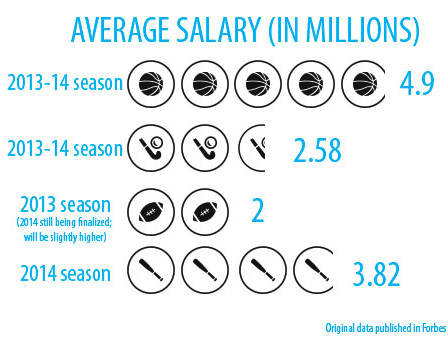WHY DO PROFESSIONAL ATHLETES STILL SKIMP ON DISABILITY INSURANCE?
A recent article in Forbes offers a detailed comparison of the average salary for professional baseball, football, basketball and hockey players. According to its author Kurt Badenhausen, the MLB saw its biggest annual salary increase since 2001, nearly doubling the average NFL salary but still trailing behind the NBA.
The average MLB salary was $3.82 million for the 2014 season. That’s up 12 percent according to the MLB Players Association, and it’s expected to top $4 million in 2015.
Here’s how the MLB compares to other sports:

Why do the numbers matter to us?
Because, despite these salaries that dwarf the average American worker, most athletes are without real disability protection to insure against a devastating injury or illness that may end their professional careers.
Too often we see players without permanent total disability insurance that would pay a substantial monthly benefit based on prior earnings after a 90, 120, 180 or 365-day wait.
With an NFL player’s average career spanning only 3.5 years and the NHL loaded with explosive hits, why don’t more players get the protection they need?
Baseball and the NBA stats are equally stark when it comes to players purchasing career-ending coverage, loss of endorsement protection or permanent total disability to replace monthly earnings.
Is it a bulletproof mentality that, despite all the hits their will and work ethic, brought them to the pinnacle of professional success? Or is it a lack of planning on the part of the financial planners or the players’ handlers?
As the top disability lawyer to the pros, I am always deeply concerned that when contracts are being negotiated, real disability and endorsement protection isn’t on the table.
The threat of a career-ending injury comes with potential loss of future earnings, endorsements and more, and they’re not uncommon.
Notable careers affected or ended by injuries
NFL: Dallas Cowboys linebacker DeVonte Holloman had a career-ending neck injury in August 2014. It was reported this injury was related to a spinal problem that kept him benched for half of his rookie season in 2013.
San Francisco 49ers running back Marcus Lattimore retired before ever playing a game as a result of a devastating knee injury. His retirement was announced in November 2014.
NHL: Windsor Spitfire forward Eric Wellwood officially retired in May 2014 after suffering a career-ending injury 14 months prior. Wellwood slid into the boards during a 2013 AHL playoff game, resulting in two completely severed tendons and another tendon, his Achilles and an artery severed 70 percent.
NBA: Former San Antonio Spurs point guard T.J. Ford abruptly retired in March 2012 after repeated injuries to his spine throughout his career. Ford was elbowed in his surgically repaired spine five days prior to his decision to retire early and avoid further disabling injuries.
Former Houston Rockets center Yao Ming retired in July 2011 after determining he was unable to make a complete recovery from a stress fracture in his left ankle and a tendon strain.
MLB: Former Toronto Blue Jays pitcher Roy Halladay announced his retirement in December 2013 after being plagued by shoulder problems in the 2012 and 2013 seasons. Halladay had surgery in May 2013 to repair a partially torn rotator cuff, frayed labrum and bone spur in his right shoulder, but his return to play was not successful.
What’s the takeaway?
In the high-paying field of professional sports, too few athletes are being counseled to take the extra steps to protect their future with disability insurance.
Injuries are a guarantee, but coverage isn’t. Athletes need to protect themselves in every way they can. A trusted insurance agent or a trusted disability insurance lawyer can help decide what type of policy would best serve these athletes.


